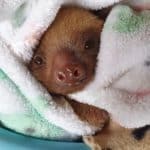Meet Amalur.
Amalur is an orphaned two-fingered sloth (Choloepus Hoffmanni) in Toucan Rescue Ranch’s care. She is one of our youngest orphaned sloths at the moment. Found on the ground with no mom, she was luckily rescued and brought to the Toucan Rescue Ranch. She weighs 746 grams and is receiving milk every 6 hours. She LOVES munching on fresh leaves and is becoming more reliant on solid foods. Our hope is to release her back into the wild once old enough. Amalur has a very long road before that happens. So she will enjoy Sloth Elementary at Toucan Rescue Ranch until she slowly starts to graduate through our Saving Sloths Together program.
Why do Sloths Need Help?
Historically, sloths have been a highly successful arboreal species however, growing human interactions and development in Costa Rica have made it difficult for them to thrive. As humans move further into the forests and coastlines, destroying natural habitats, sloths have been negatively impacted and greater numbers are dying. Couple this with the growing social media trends and publicities, sloths are faced with more threats to their survival than ever before.
What Dangers do Sloths Face?

Sloths are rescued for various reasons. Common incidents include electrocution from power lines, car accidents, dog attacks, and human encroachment such as deforestation and the illegal pet trade. Oftentimes, baby sloths suffer from injuries and the loss of their mother from such incidents. Babies are often found abandoned by their mother for unknown reasons. (Likely the mother was involved in an accident.) To help with this ongoing issue with sloths, Toucan Rescue Ranch established a program called Saving Sloths Together with another organization in Costa Rica called The Sloth Institute of Costa Rica. Together, we rescue hurt sloths and give them a second chance at life with the goal of releasing them back into the wild once “graduated” from the rehabilitation and release program.
A unique component of this program is the ability to take a hand-raised, orphaned sloth and give it a second chance at being wild. The concept of releasing captive-raised sloths back into the wild is a feat that has rarely been done with success. However, the combined expertise and resources of the SST project is eager to prove that sloths don’t belong in cages but #backinthetrees because they were all #BornToBeWild.
Stages of the TRR Release Program
• Pre-school: Newborn to 3-months old. The focus is on growing and drinking their milk! Start to taste various solid foods but isn’t the main diet staple yet.
• Elementary School: Less than 6-months old. At this stage, the focus is on eating more solids and getting more climbing practice while still staying close to the nursery for warmth and milk.
• Middle School: 6-months to 1-year. Solids make up most of the diet at this point. Focus on climbing more, becoming more nocturnal, and being more independent.
• High School: 1-year – 1.5-years. Weaning completely off milk. Focus on growing large enough and independent enough for the “classroom” enclosure.
• University: 1.5-years+, graduate to the Pre-Release Enclosure – focus on eating more wild foods, weather, environmental changes, total independence, etc.
Items Essential in Caring for Sloths
• Hand Warmers
• Goats Milk
• Pedialyte
• Blankets
• Syringes
• Nipples
Make a Difference for Sloths!
Your gift goes beyond the dollars and cents of your donation. With your support, you will give orphaned, hand-raised, and rehabilitated sloths a second chance at life in the wild. It is our goal that together, every rescue call and abandoned individual found will be returned to a natural life back among the trees. Saving Sloths Together provides a future not just for the sloths who go through the program, but for the health and understanding of the species nationwide. Your donation allows us to dedicate the time, medical and expert care to one of the most charismatic species in Costa Rica, the sloth.

